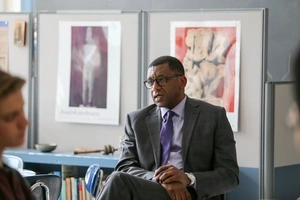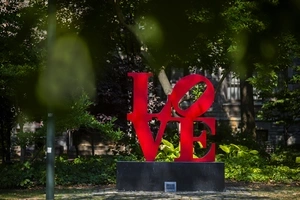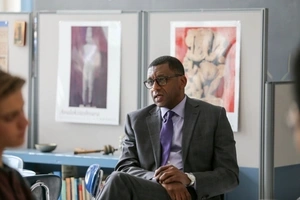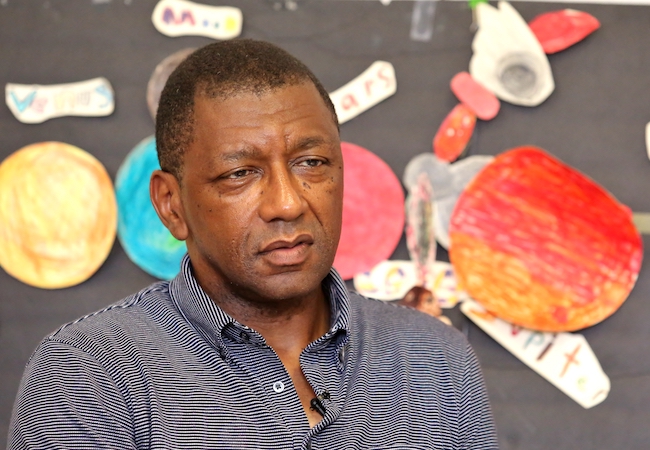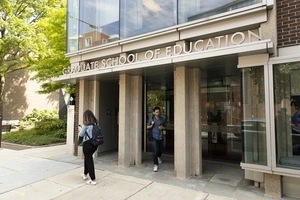Biography
Dr. Howard Stevenson is the Constance Clayton Professor of Urban Education, Professor of Africana Studies, in the Human Development & Quantitative Methods Division of the Graduate School of Education at the University of Pennsylvania. He is the Executive Director of the Resilience Empowerment Collaborative, a research, program development, and training center that brings together community leaders, researchers, authority figures, families, and youth to study and promote racial literacy and health in schools and neighborhoods. From 2015 to 2021, he was co-director of Forward Promise, a national philanthropy office that funds community-based organizations that help families of color heal, grow, and thrive above the trauma of historical and present-day dehumanization.
He received the 2020 Gittler Prize, by Brandeis University, for outstanding and lasting scholarly contributions to racial, ethnic, and/or religious relations. He was listed in the 2021 RHSU Edu-Scholar Public Influence Rankings of the top university-based scholars in the United States who did the most to shape educational practice and policy. In 2021, Dr. Stevenson was elected to membership in the National Academy of Education (NAEd). The NAEd advances high-quality education research and its use in policy and practice and consists of U.S. and international associates who are elected on the basis of outstanding scholarship related to education.
Education
- Ph.D. (Clinical Psychology) Fuller Graduate School of Psychology, 1985
- B.A. (Psychology and Sociology) Eastern College, 1980
Areas of Expertise
- Child development
- Racial literacy
- Racial/ethnic socialization
- African-American psychology
- Violence and bullying prevention
- Family and parental engagement
- Psychology
More Information
Podcast Episodes
Espresso Talk Today – May 13, 2022
Dr. Howard Stevenson Discusses Coping with Racial Encounters
At Home with Linda & Drew Scott – June 6, 2021
Dr. Howard C. Stevenson on Racial Literacy
TED Radio Hour – March 29, 2019
How Can We Mindfully Navigate Everyday Racism
Academic Programs
Interdisciplinary Studies in Human Development, M.S.Ed. Interdisciplinary Studies in Human Development, Ph.D. Medical Education, M.S.Ed. Mid-Career Doctoral Program in Educational Leadership, Ed.D. Principal Certification Professional Counseling, M.Phil.Ed. School and Mental Health Counseling, M.S.Ed. School Leadership, M.S.Ed.Research Interests and Current Projects
Dr. Stevenson develops racial socialization-based culturally responsive therapeutic interventions and research to resolve face-to-face racial conflicts and build racial literacy skills for leaders within independent and public K–12 schooling, community mental health centers, teachers, police, parents, and youth. His publications of measures and interventions reflect the daily racially lived experiences of families and youth. His work has been funded by the W.T. Grant Foundation, Annenberg Foundation, Robert Wood Johnson Foundation, and the National Institutes of Mental Health and Child Health and Human Development.
Two research projects examine the benefits of racial literacy and culturally responsive interventions. The PLAAY (Preventing Long-term Anger and Aggression in Youth) Project uses basketball and group therapy to help youth and parents cope with stress and trauma from violence and social rejection. This project has been implemented in several cities across the United States since 2010. Dr. Stevenson also co-led the SHAPE-UP: Barbers Building Better Brothers Project with Drs. Lorretta and John Jemmott, training Black barbers as health educators, while they are cutting hair, to teach Black 18–24-year-old males to reduce their risk of HIV/STDS and retaliation violence.
From 1994 to 2002, Dr. Stevenson was faculty master of the W. E. B. DuBois College House at Penn. In 1993, he received the W. T. Grant Foundation’s Faculty Scholar Award, a national research award — given to only five researchers per year — which funds five years of research. In 1994, Dr. Stevenson was a Presidential Fellow at the Salzburg Seminar in American Studies, where 35 other community activists and researchers from 30 countries presented their community health intervention projects. In 1995, Dr. Stevenson served on a 12-member academic panel to consult on the development of a National Strategic Action Plan for African American Males, sponsored by the National Drug Control Policy Office in the Office of the President.
Publications
Featured Publications
- Howard C. Stevenson
- Howard C. Stevenson
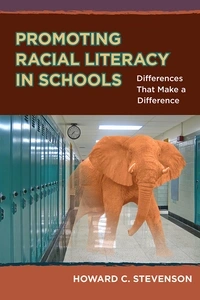
Promoting Racial Literacy in Schools: Differences That Make a Difference
Teachers College Press
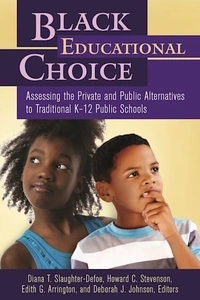
Black Educational Choice: Assessing the Private and Public Alternatives to Traditional K-12 Public Schools
ABC CLIO Praeger
Collins, J. A., & Stevenson, H. C. (2023). Racial climate reform in independent schools: How coping self-efficacy buffers systemic and proximal racial stress for students of color. Psychology in the Schools. Advance online publication. https://doi.org/10.1002/pits.22993
Jemmott, L. S., Jemmott, J. B., Stevenson, H. C., & Chittamuru, D. (2023). Barber-led HIV/sexually transmitted infection risk reduction for young African-American men: Efficacy and mediation in a cluster randomized controlled trial. Journal of Adolescent Health, 72(4), 575–582. https://doi.org/10.1016/j.jadohealth.2022.10.030
Kiang, L., Chan, M., Lassiter, R. A., Christophe, N. K., Stein, G. L., Jones, S. C. T., Stevenson, H. C., & Anderson, R. E. (2023). Ethnic-racial identity and socialization competency: How minoritized parents “Walk the Talk”. Cultural Diversity and Ethnic Minority Psychology. Advance online publication. https://doi.org/10.1037/cdp0000605
Kiang, L., Chan, M., Lassiter, R. A., Christophe, N. K., Stein, G. L., Jones, S. C. T., Stevenson, H. C., & Anderson, R. E. (2022). The silver linings of COVID-19 and racism pandemics? Asian American Journal of Psychology. Advance online publication. https://doi.org/10.1037/aap0000289
Christophe, N. Keita, Stein, G. L., Kiang, L., Johnson, N. C., Jones, S. C. T., Stevenson, H. C., Anyiwo, N., & Anderson, R. E. (2022). A 21st century take on racial-ethnic socialization: Patterns of competency and content among diverse parents of color. Social Sciences, 11(88). https://doi.org/10.3390/socsci11020088
Jones, S. C. T., Anderson, R. E., & Stevenson, H.C. (2021). Not the same old song and dance: Viewing racial socialization through a family systems lens to resist racial trauma. Adversity and Resilience Science, 2, 225-233. https://doi.org/10.1007/s42844-021-00044-8 .
Stevenson, H. C., Jemmott, L. S., Jemmott, J. B., Icard, L., White, S. L., Talley, L. M., Chittamuru, D., Kim, S., & O'Leary, A. (2021). Shape-up: Efficacy of a culturally responsive barbershop-based violence reduction intervention RCT for young black men. Psychology of Men & Masculinities, 22(4), 579–591. https://doi.org/10.1037/men0000359
Jones, S. C. T., Anderson, R. E., & Stevenson, H. C. (2021). Differentiating competency from content: Parental racial socialization profiles and their associated factors. Family Process, 61(2), 705–721. https://doi-org.proxy.library.upenn.edu/10.1111/famp.12699
Anderson, R. E., Jones, S. C. T., Saleem, F., Anyiwo, N., Bless, K., Nisbeth, K., Resnicow, K., & Stevenson, H. C. (2021). Interrupting the pathway from discrimination to black adolescents’ psychosocial outcomes: The contribution of parental racial worries and racial socialization competency, Child Development, 92(6), 2275–2394. http://doi.org/10.1111/cdev.13607
Coleman-King, C. C., Adams-Bass, V. N., Bentley-Edwards, K., Thomas, D., Thompson, C., Michael, A., Miller, G., Charity-Parker, B., & Stevenson, H. C. (2021). Got skillz? Recasting and negotiating racial tension in teacher–student relationships amidst shifting demographics. Social Sciences, 10(3), 99–109. https://doi.org/10.3390/socsci10030099
Morris, T., & Stevenson, H. C. (Fall 2020). Sponsorship: Diversifying the pipeline of emerging leaders. Independent School Magazine, 86–93.
Bentley-Edwards, K. L., Stevenson, H. C., Thomas, D. E., Adams-Bass, V. N., & Coleman-King, C. C. (2020). Teaching scared: Pre-service TFA teacher appraisals of racial stress, socialization and classroom management self-efficacy. Social Psychology of Education, 23, 1223–1257. https://doi.org/10.1007/s11218-020-09578-8
Anderson, R. E., Jones, S. C. T., & Stevenson, H. C. (2020). The initial development and validation of the Racial Socialization Competency Scale: Quality and quantity. Cultural Diversity and Ethnic Minority Psychology, 26(4), 426–436. http://dx.doi.org/10.1037/cdp0000316
Anderson, R. E., & Stevenson, H. C. (2019). RECASTing racial stress and trauma: Theorizing the healing potential of racial socialization in African American families. American Psychologist, 74(1), 63–75. http://dx.doi.org/10.1037/amp0000392
Anderson, R. E., McKenny, M. C., Stevenson, H. C. (2019). EMBRace: Developing a racial socialization intervention to reduce racial stress and enhance racial coping among Black parents and adolescents. Family Process, 58, 53–67. https://doi.org/10.1111/famp.12412
Slaughter-Acey, J. C., Talley, L. M., Stevenson, H. C., & Misra, D. P. (2019). Personal versus group experiences of racism and risk of delivering a small-for-gestational age infant in African American women: A life course perspective. Journal of Urban Health, 96(2), 1–12. https://www.ncbi.nlm.nih.gov/pubmed/30027428
Anderson, R. E, Jones, S. C. T., Navarro, C. C., McKenny, M. C., Mehta, T., Stevenson, H. C. (2018). Addressing the mental health needs of Black American youth and families: A case study from the EMBRace intervention. International Journal of Environmental Research and Public Health, 15(5), 898. https://doi.org/10.3390/ijerph15050898
Baker, J. L., Stevenson, H. C., Talley, L. M., Jemmott, L. S., & Jemmott, J. B. (2018). Development of a barbershop-based racial socialization violence intervention for young Black emerging adult men. Journal of Community Psychology, 46(4), 1–13. https://onlinelibrary.wiley.com/doi/full/10.1002/jcop.21971
Anderson, R. W., McKenny, M., Mitchell, A., Koku, L., & Stevenson, H. (2018). EMBRacing racial stress and trauma: Preliminary feasibility and coping outcomes of a racial socialization intervention. Journal of Black Psychology, 44(1), 25–46. https://psycnet.apa.org/doi/10.1177/0095798417732930
Stevenson, H. C. (2017). Raisins in the sun: White teacher as a force of nature buffering the radiation of racial retaliation. In E. Moore, A. Michael, & M. Penick-Parks (Eds.), The guide for white women who teach black boys. Corwin Press.
Stevenson, H. C. (2016). Dueling narratives: Racial socialization and literacy as triggers for re-humanizing African American boys, young men, and their families. In L. M. Burton, D. Burton, S. M. McHale, V. King, & J. Van Hook (Eds.), Boys and men in African American families (pp. 55–84). Springer International Publishing/Springer Nature. https://doi.org/10.1007/978-3-319-43847-4_5
Bartoli, E., Michael, A., Bentley-Edwards, K. L., Stevenson, H. C., Shor, R., & McClain, S. (2016). Training for colorblindness: White racial socialization. Whiteness and Education, 1, 125–136.
Bentley-Edwards, K., & Stevenson, H. C. (2016). The multidimensionality of racial/ethnic socialization: Scale construction for the cultural and racial experiences of socialization (CARES). Journal of Child and Family Studies, 1–13. https://doi.org/10.1007/s10826-015-0214-7
Burton, L. M., Winn, D-M., Stevenson, H., & McKinney, M. (2015). Childhood adultification and the paradox of parenting: Perspectives on African American boys in economically disadvantaged families. In J. Arditti (Ed.), Family problems: Stress, risk, and resilience (pp. 167–182). Wiley.
Stevenson, H. C., & Jones, K. M. (2015). What if my Trayvon came home? Teaching a wretched truth about breathing while Black. In K. Fasching-Varner & Nicholas Hartlep (Eds.), The assault on communities of color. Rowman & Littlefield.
Shahmoon-Shanok, R., & Stevenson, H. C. (2015). Calmness fosters compassionate connections: Integrating mindfulness to support diverse parents, their young children, and the providers who serve them. ZERO TO THREE Journal, 35(3), 18–30.
Stevenson, H. C. (2014). Promoting racial literacy in schools: Differences that make a difference. Teachers College Press.
Stevenson, Jr., H. C. (Ed.). (2003). Playing with anger: Teaching coping skills to African American boys through athletics and culture. Greenwood Publishing, Praeger.
Stevenson, H. C., Davis, G. Y., & Abdul-Kabir, S. (2001). Stickin’ to, watchin’ over, and gettin’ with: An African American parent’s guide to discipline. Jossey-Bass.
Related News
Howard Stevenson is helping small local non-profits navigate life after federal funding cuts
In the Media | The Philadelphia Citizen,
Howard Stevenson is among the donors to help fund small Philadelphia non-profits amidst federal funding cuts
- `
-
Healing and justice': Stevenson brothers talk hidden hurts, hostilities in today's political climate
In the Media | The Philadelphia Tribune
Howard Stevenson and his brother and civil rights attorney Bryan, discussed race and justice on Sept. 25 at the Filter Club in Center City.
-
Constance Clayton Professor of Urban Education Howard Stevenson and his brother Bryan, a civil rights attorney and author of the best-selling book Just Mercy, reflect on their Delaware childhood, their social justice work and how to make sense of these troubled times on WHYY's The Connection.
-
Topics
Howard Stevenson shares his tool to help individuals, especially young people, cope with insults and threatening language while managing stress in divisive debates or tense situations.
-
Eight Penn GSE faculty feature prominently in the rankings, which celebrate the most influential education researchers in the nation.
-
Diddy’s Twins Highlight Students With Jailed Parents
In the Media | The Dallas Weekly
TopicsHoward Stevenson emphasizes that parental incarceration profoundly affects Black children's emotional and academic lives, advocating for trauma-informed school environments that provide emotional support and tools for recovery.
-
Transforming racial conflict into opportunities for growth
In the Media | Chestnut Hill Local
TopicsHoward Stevenson promotes racial literacy to address racial conflict, focusing on understanding motivations behind harmful actions and combining accountability with education.
-
The Constance Clayton Professor of Urban Education and executive director of REC weighed in on a University of Georgia study revealing how discriminatory experiences could harm children’s development.
-
The initiative provides University funding up to $100,000 for Penn teams piloting practical projects that address social justice issues in Philadelphia.
-
A new year means a new version of the RHSU Edu-Scholar Public Influence Rankings, with the 2024 edition announced yesterday by Education Week. Nine researchers from the University of Pennsylvania made the annual 200-member list, which was created by Rick Hess of the American Enterprise Institute (AEI) to gauge the public impact of ed scholars’ contributions.
-
Topics
Helping students who feel under threat is one of the hardest things a teacher or administrator can do. Howard Stevenson offers some ideas for creating safer spaces for students and educators alike.
-
As a keynote speaker at the "Racism, Racial Literacy and Mental Health" conversation, Howard Stevenson says you need to heal before you can fight to change racism.
-
Eight University of Pennsylvania-affiliated researchers are ranked in the top 200 nationwide – and all eight are associated with Penn GSE.
-
Howard Stevenson, director of the Racial Empowerment Collaborative at the University of Pennsylvania shares insight on the importance of culturally responsive mental health treatment.
-
Last cut for neighborhood barber after 70 years in West Philadelphia
In the Media | Philadelphia Inquirer
TopicsHoward Stevenson says that Black men share intimate and personal stories in barbershops, making them ideal places to help deal with emotional and physical.
-
Howard Stevenson emphasizes the importance of men and boys from underrepresented backgrounds finding a trusted therapy outlet, as they can benefit from mental health services.
-
Howard Stevenson speaks about the PLAAY Project, which prepares Black male youth to cope with crisis and high-stress situations through sports.
-
Topics
Howard Stevenson provides tips on coping in the aftermath of the shootings in Uvalde, Texas.
-
In the 2021 Constance E. Clayton lecture, Dr. Courtney D. Cogburn points to the critical need to imagine Black futures in the metaverse and describes her work on an immersive virtual reality experience in which viewers become a Black male encountering racism.
-
How to raise kids who won’t be racist
In the Media | The New York Times
Howard Stevenson offered tips for how parents can address racist or insensitive comments made by children. “Get a sense of what they understand it to mean from their perspective,” he said. “Where did they hear it from? How is it being used in the social context they’re in? Then you have a better angle to how you can speak to it.”
-
Trial by trauma
In the Media | Vox
"For so many Black families who experience this, the hardest part is about getting people to believe it happened and care." — Howard Stevenson
-
Penn GSE’s Howard Stevenson and Nancy Hornberger will be inducted at the National Academy of Education (NAEd) at November’s NAEd Annual Meeting.
-
How are teens and young adults coping?
In the Media | “Radio Times” WHYY
Howard Stevenson and Frances Jensen spoke about how young people view the threat of COVID-19 and the effects of police violence on their mental health.
-
Howard Stevenson said Black students often are denied a sense of belonging in private school environments. When combined with experiences of racism, this can affect these students’ long-term mental health.
-
Howard Stevenson spoke about how parents can best address race with children. “They’re listening to you, but they’re also watching how you say it,” he said.
-
Howard Stevenson spoke with Vox about how parents can teach their children about racism. He explained that simply being a good person is not enough. To teach their children, parents need to understand how racism works and how to fight it.
-
When police kill black people, the whole community suffers. Experts offer coping strategies.
In the Media | The Philadelphia Inquirer
Howard Stevenson said, “We underestimate the negative effects of swallowing our feelings during racial moments. Research is showing more and more that if we don’t manage racial stress and trauma, it comes out in our health and bodies and sleep.” To make progress, people need to start having hard conversations about race to improve racial literacy — the ability to read, recast, and resolve a racially stressful moment.
-
Howard Stevenson said, "Teachers can be incredibly powerful in teaching young people to engage in these conversations rather than avoid them."
-
Talking to children after racial incidents
In the Media | Lion's Story
A Q&A with Howard Stevenson on how parents and guardians can find a balance between two questions: Do we try to explain the strife our child sees on television? Or should we try to shield her from such “grown up” problems?
-
Howard Stevenson on what COVID-19 has revealed about race and health.
-
Howard C. Stevenson was named the 2020 Gittler Prize recipient by Brandeis University. “Not only has Howard Stevenson brought a better understanding of the detrimental effects caused by racial stress and trauma through his scholarship, he actively leads the way in improving the lives of people affected by these issues,” Brandeis President Ron Liebowitz said.
-
Six researchers from Penn GSE have made Education Week’s 2020 Edu-Scholar Public Influence Rankings list.
-
Howard Stevenson offers advice for how educators can protect their students and care for themselves


